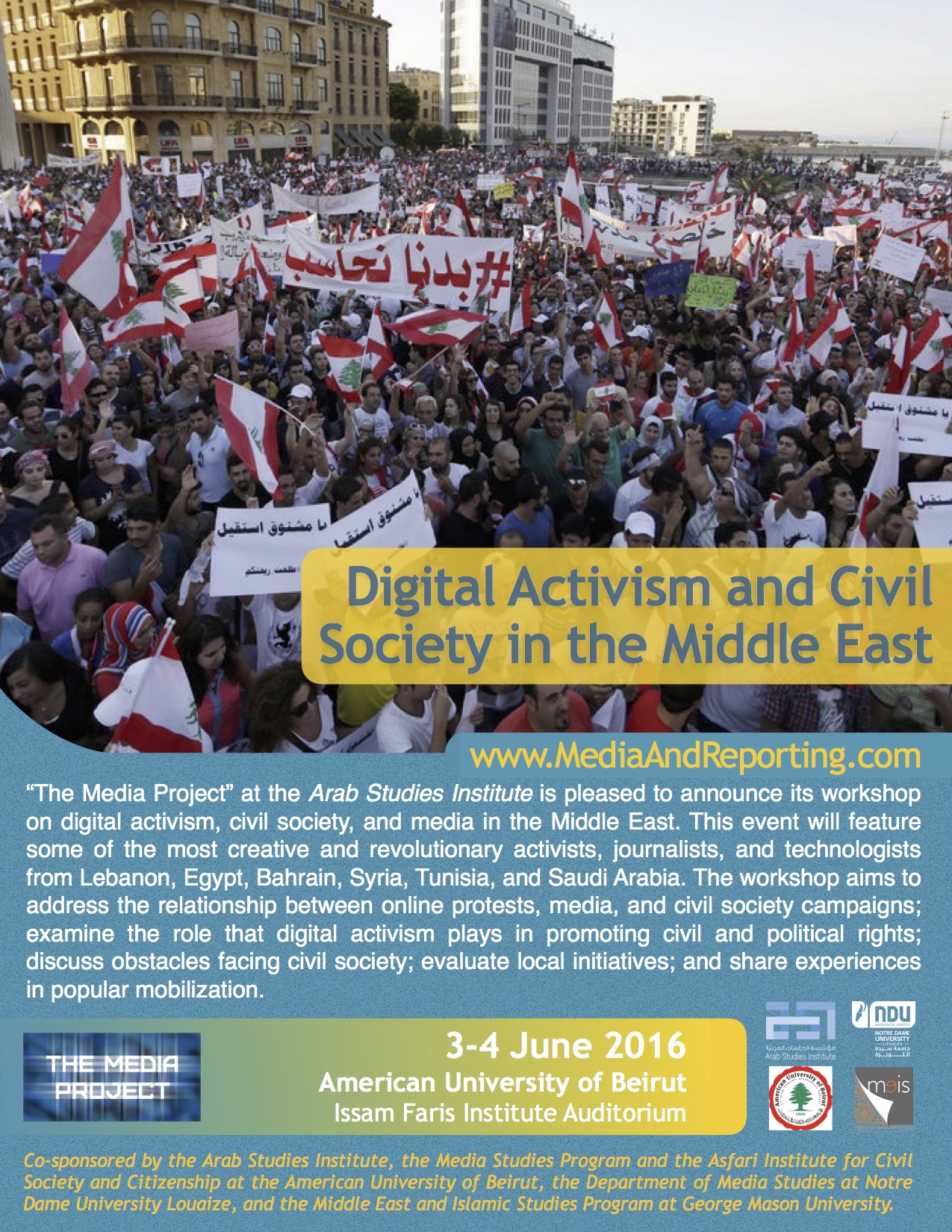"The Media Project” at the Arab Studies Institute is pleased to announce its workshop on digital activism, civil society, and media in the Middle East. the second in a series of critical workshops, conferences, and events will be held in Beirut, Lebanon to address the relationship between digital activism as spurred by the Arab uprisings and civil society institutions and actors. This event will feature some of the most creative and revolutionary activists, journalists, and technologists from Lebanon, Egypt, Bahrain, Syria, Tunisia, and Saudi Arabia. The workshop aims to address the relationship between online protests, media, and civil society campaigns; examine the role that digital activism plays in promoting civil and political rights; discuss obstacles facing civil society; evaluate local initiatives; and share experiences in popular mobilization. Speakers will discuss the role of digital media activism in promoting civil and political rights in light of renewed challenges to social, economic, and political injustice.
The workshop is co-sponsored by the Arab Studies Institute, the Media Studies Program and the Asfari Institute for Civil Society and Citizenship at the American University of Beirut, and the Department of Media Studies at Notre Dame University.
Conference Participants: Diala Haidar, Bassam Kantar, Safa Al-Ahmad, Alaa Shehabi, Lina Attalah, Sami Ben Gharbia, Malihe Razazan, Neamat Badreddine, Jessica Dheere, Mohammad Dibo, Rouba El Helou, Riad Kobeissi, Diana Skeini, Chaker Noon, Nazeer Rida, Habib Battah, May Farah, Maria Bou Zeid, Adel Iskandar, Shahram Aghamir, Rania Masri, Alicia Cagle, Eugene Sensenig, Nassim Abi Ghanem, and Layal Bahnam.
Organizers: Maria Bou Zeid, Adel Iskandar, May Farah, Elie Haddad, and Alicia Cagle.
VISIT THE MEDIA PROJECT WEBSITE
Conference Schedule
Issam Fares Auditorium
American University of Beirut
Beirut, Lebanon
3-4 June 2016
Friday, June 3
8:30-9:00 Registration
9:00-9:15: Introduction to the Conference
9:15-10:45 Panel 1: Digital Mobilization, Advocacy, & Networking Strategies: Lessons Learned
This panel will shed light on the role of digital activism in creating and boosting political and social change. The aim is to discuss the tools and tactics adopted by activists for promoting civil and political rights in order to evaluate the strategies implemented in the latest movements during the Arab Uprisings, in Lebanon with the “You Stink” campaign, and other popular rights-based mobilizations. It will conclude with the future of social movements online and the digital dimensions of civil society.
Panelists:
- Emad Bazzi
- Lucien Bourjeilli
- Habib Battah
- Sami Ben Gharbia
- Alaa Shehabi
Chair: Malihe Razazan
Discussant: May Farah
10:45-11:45 Keynote Speaker: Sami Ben Gharbia, “The Limits of Citizen Media Post-Arab Spring”
12:45-13:45 Keynote Speaker: Lina Attalah, “Betrayal: Online Media and The New Rules of the Game”
13:45-15:15 Panel 2: Obstacles & Barriers
The goal of this panel is to address a panorama of barriers from technical to ideological ones. Discussions may include a description of the obstacles for digital mobilization, and examine different cases in which barriers impact various phases of advocacy (pre-mobilization), during the mobilization, and post-mobilization.
Panelists:
- Neamat Badreddine
- Jessica Dheere
- Rouba El Helou
Chair: Shahram Aghamir
Discussant: Eugene Sensenig
15:30-17:00 Panel 3: Civil Society and the Media: Vision, Messages and Resonance
Media can serve positively or negatively the causes and ideas of the civil society and how activists can use the media in advancing the struggle. This third panel will deal with the relation between media/activists and civil society and how they can serve each other. It will consist of an evaluation of the use of media by activists during the Arab Spring in general and the Lebanese waste crisis in particular and will emphasize the interrelation between traditional and social media on all these levels.
Panelists
- Safa Al-Ahmad
- Riad Kobeissi
- Diana Skeini
- Bassam El Kantar
Chair: Layan Banham
Discussant: Rania Masri
Saturday, June 4
9:30-11:00 Panel 4: Going Hyperlocal
Hyperlocal media can enhance digital participation reinforcing a sense of community through their connections to neighborhoods and the collectives that have a local presence. Are hyperlocal media platforms popular in the Arab World and MENA Region? How can these platforms serve activists and civil society in their struggle? This panel will tackle how social media is contributing to create and reinforce the pattern of hyperlocal media and how people use such platforms to voice their concerns. Additionally, branching from this point, the panel will look to citizen journalism as a way to contribute in the creation of hyperlocal news content.
Panelists:
- Haramoun Hamieh
- Mohammad Dibo
- Nazeer Rida
- Chaker Noon
Chair: Nassim Abi Ghanem
Discussant: Maria Bou Zeid
11:30-13:00 Closing Panel: Transnational Solidarity
This closing panel reflects on new perspectives to challenge myths and stigmas pertaining to digital activism. It resides in how to build social networks not only in the virtual world but also in the real world across geographic borders.
Panelists:
- Malihe Razazan
- Safa Al-Ahmad
- Alaa Shehabi
- Lina Attalah
Chair: Alicia Cagle
Discussant: Adel Iskandar

.png)